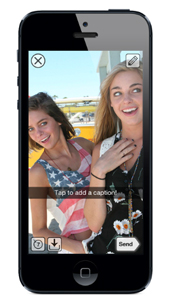Snapchat, the fast-rising photo and video messaging app, was thrust into the spotlight this month when a major marketer used it to help launch a new menu item and a privacy complaint put it on PR defense.
 The Snapchat app, which allows users to send content like videos or photos which are only available to an individual or group for a set amount of time, has logged more than five million downloads. It is popular with teens and young adults and drew the mass attention of marketers this month when Taco Bell used the app to send a snapshot of a burrito to fans to introduce a new menu item.
The Snapchat app, which allows users to send content like videos or photos which are only available to an individual or group for a set amount of time, has logged more than five million downloads. It is popular with teens and young adults and drew the mass attention of marketers this month when Taco Bell used the app to send a snapshot of a burrito to fans to introduce a new menu item.
Mary Ritti, founding partner of Burson-Marsteller tech start-up North of Nine Communications, has moved in-house at Snapchat as VP of communications for the San Francisco-based photo messaging app.
Ritti was a nine-year veteran of Burson-Marsteller, handling Intel and H-P, before moving to North of Nine when it was set up in early 2011.
Snapchat logged a reported 150M daily photo shares in April.
A forensics examiner this month sounded an alarm when he reported that Snapchat photos do not disappear when they expire.
Snapchat responded May 9 that content is deleted from its servers but can remain on mobile devices in some situations the same way data remains on a hard drive after being deleted. The examiner's report, and subsequent media pickup, sparked a complaint to the Federal Trade Commission by the Electronic Privacy Information Center.
"We're really not paying much attention to it," Ritti told U.S. News & World Report when asked about the report. In a statement to the Los Angeles Times, she said: "There have always been ways to save snaps, not the least of which would be to take a screenshot or a picture with another device. We do not intend to make any further comment about this complaint."
"Also, if you’ve ever tried to recover lost data after accidentally deleting a drive or maybe watched an episode of CSI, you might know that with the right forensic tools, it’s sometimes possible to retrieve data after it has been deleted," the company said on its blog May 9. "So… you know… keep that in mind before putting any state secrets in your selfies :)"



 Have a comment? Send it to
Have a comment? Send it to 
No comments have been submitted for this story yet.